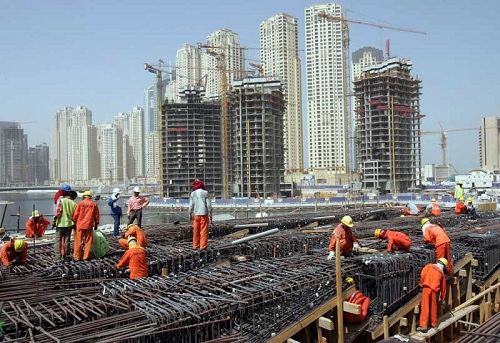*Deepak Razdan
The Government took a decisive step towards simplifying and amalgamating the vast mass of labour laws when it presented before the nation The Code on Wages, 2017, a Bill which combines features and provisions of four existing labour laws pertaining to wages. The Bill was introduced in the Lok Sabha during the Monsoon Session of Parliament on 10th August, 2017. Intended to bring relief to both employers and employees, the Code amalgamates, simplifies and rationalises the relevant provisions of the four Central labour enactments, namely the Payment of Wages Act, 1936; the Minimum Wages Act, 1948; the Payment of Bonus Act, 1965; and the Equal Remuneration Act, 1976. The four Acts will stand repealed with the passage of the Bill. Facilitating easier compliance of the law, the Code will ultimately create conditions for setting up of more enterprises and fresh employment opportunities.The Statement of Objects of the Bill said the amalgamation of the laws would facilitate their implementation and remove the multiplicity of definitions and authorities, without compromising on the basic concepts of welfare and benefits to workers. The proposed legislation would bring the use of technology in its enforcement and thereby bring transparency and accountability for effective enforcement of the law. Widening the scope of minimum wages to all workers would be a big step for equity.
The Bill provides for all essential elements relating to wages — equal remuneration, its payment, and bonus. The provisions relating to wages shall be applicable to all employments covering both organised as well as un-organised sectors and the power to fix minimum wages continues to be vested in the Central as well as State Governments, in their respective spheres. There are clear definitions of employer, employee, worker, minimum wage and wages.
The Code will enable the appropriate Government to determine the factors by which the minimum wages shall be fixed for different categories of employees. The factors shall be determined taking into account the skills required, the arduousness of the work assigned, geographical location of the workplace and other aspects which the appropriate Government considers necessary.Provisions relating to timely payment of wages and authorised deductions from wages, which are at present applicable only in respect of employees drawing wages up to Rs 18,000 per month, shall be made applicable to all employees irrespective of wage ceiling. The appropriate Government may extend the coverage of
such provisions to Government establishments also.
Ensuring that there is no discrimination on the basis of gender in the payment of wages, the Bill incorporates in its first chapter itself provisions for “Equal Remuneration” in Section 3, which says “There shall be no discrimination among employees on the ground of gender in matters relating to wages by the same employer, in respect of the same work or work of similar nature done by any employee.”
No employer shall pay to any employee wages less than the minimum rate of wages notified by the appropriate Government for the area, establishment or work as may be specified in a notification. While fixing minimum wages in respect of any employment for the first time under the Code, the appropriate Government, which can be Central or State Government, will appoint a committee comprising representatives of employers, employees and independent members, to go into all issues and make recommendations. This would ensure justice to all stakeholders. “The appropriate Government shall review or revise minimum rates of wages at an interval of five years,” says the chapter on minimum wages.
Under the Bill, the Central Government will have the power to fix a national minimum wage, with a provision that there can be different national minimum wage rates for different States or geographical areas. State Governments will not fix any rate lower than the national rate. If any State Government earlier fixed a rate higher than the national rate, it will not reduce its wage rate. The Central Government before fixing a national minimum wage rate will take the advice of a Central Advisory Board. There is provision for payment of overtime work done.
Under its payment of wages provisions, the Code says “all wages shall be paid in current coin or currency notes or by cheque or through digital or electronic mode or by crediting the wages in the bank account of the employee.” Wage payments can be made daily, weekly, fortnightly or monthly and the Bill has fixed time-limits for the payments.
The provisions on payment of bonus say that the bonus has to be paid even to employees who have put in only one month of service. Section 26 says this payment will be “an annual minimum bonus calculated at the rate of eight and one third per cent of the wages earned by the employee or one hundred rupees, whichever is higher, whether or not the employer has any allocable surplus during the previous accounting year.”The bonus payment will increase proportionately, if the allocable surplus in any accounting year is higher, subject to a maximum of 20 per cent of the wages, the Section says. The available surplus for any accounting year will be gross profits for the year, after permissible deductions including direct tax on income, profits and gains for the year. The allocable surplus will be 60 per cent of the available surplus for banks and 67 per cent for other establishments.As per Section 39, all amounts payable to an employee by way of bonus under this Code shall be paid by crediting it in the bank account of the employees by his employer within eight months from the close of the accounting year. An employer can get extension of time, but this shall not exceed, “in any case,” two years.Doing away with inspector-raj, the Code provides for Facilitators who will help employers and employees in the proper execution of the law. The Facilitators can be appointed by the Central or State Governments and given powers throughout the States or such geographical areas assigned to them. Section 51 of the Code says the Facilitator may within the limits of his jurisdiction, (a) supply information and advice to employers and workers concerning the most effective means of complying with the provisions of this Code; (b) inspect the establishment based on an inspection scheme. The inspection scheme, given by the Government, will provide for generation of a web-based inspection schedule.
The Facilitators can examine workers, “search, seize and take copies of such register, record of wages or notices or portions thereof as the Facilitator may consider relevant in respect of an offence under this Code and which the Facilitator has reason to believe has been committed by the employer,” Section 51 says. The Facilitators will be empowered under IPC and CrPC for their work.
Complaints for offences under the Code can be made by the Facilitator, employees, registered Trade Unions, or the Government. The Code has spelt out elaborate penalties for the offences. If an employer pays to his employee less than the amount due to him under the Code, he shall be punishable with fine which can go up to Rs 50,000. A repeat offence within five years can mean imprisonment extending up to three months, and fine up to Rs 1 lakh, or both.
Contravention of the Code or a rule made thereunder can mean a fine up to Rs 20,000, and a repeat offence within five years can mean imprisonment up to one month, or fine up to Rs 40,000, or both. A Facilitator can give time and opportunity to employer to comply with the Code, and may not initiate prosecution if there is compliance.
Clause 55 of the Bill provides for composition of offences. Only the offences for which there is no punishment with imprisonment shall be compounded. The compounding money shall be a sum of fifty per cent of the maximum fine. There is no compounding for a similar offence compounded earlier or for commission of which conviction was made, committed for the second time or thereafter within a period of five years.
Under various other Sections, the interests of employees are protected by the Code. The burden of proof that the due payment has been made, and without any unjustified deductions, will lie with the employer.
The Code on Wages, 2017 is the first of the four Codes proposed by the Government to give further boost to ease of doing business. The three other Codes will cover Industrial Relations; Social Security & Welfare; and Safety and Working Conditions. While they will bring about a long-awaited clarity in labour legislation, and minimize its multiplicity, their ultimate benefit will help working class know its rights and responsibilities, and look forward to larger employment opportunities.
*****
*Deepak Razdan, is a senior journalist and is at present Editorial Consultant, The Statesman, New Delhi.
Views expressed in the article are author’s personal.




































